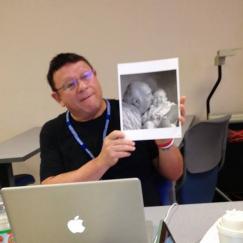All illusions are potential ways of ordering reality. The goal of criticism should therefore be not to destroy illusions but to make us more sensitive to their workings and their complexity.

Frank Romanelli
The Media Education Lab advances media literacy education through research and community service. We emphasize interdisciplinary scholarship and practice that stands at the intersections of communication, media studies and education.
All illusions are potential ways of ordering reality. The goal of criticism should therefore be not to destroy illusions but to make us more sensitive to their workings and their complexity.
- Leo Braudy, The World in a Frame, 1977
Media Education Lab
https://mediaeducationlab.com
Email: renee@mediaeducationlab.com
© 2017, Media Education Lab, University of Rhode Island. All rights reserved.
Developed By Young Globes
John
John Dewey wrote, “If we
John Dewey wrote, “If we teach today’s students as we taught yesterday’s, we rob them of tomorrow.”
It didn't take me long in the first year of my teaching to realize how ineffective and futile it was to teach anything that wasn't relevant to my students. On that day, I made a contract with my students that I have never broken, "If you don't understand why you should learn or do something in this class, ask me. If I don't give you a satisfactory answer, we won't do it." I also learned early in my career that authentic learning was relationship based which is why I need to tell you about my other digital media literacy grandparent, my actual maternal grandfather, Nash.
My grandfather, Nacenzio Viccione, was a jewelry maker in Providence. He was also a self-educated engineer, who often lamented about his missed opportunity to go to college because of his family's need for him to work. I was his first and favorite grandchild. We would often discuss life and learning while sitting at the kitchen table or while I was helping him with plumbing, electrical wiring, or carpentry.
When I was in middle school, Nash bought me a slide rule. I never learned how to use it. When I graduated from high school, he bought me my first personal computer, a Tandy Color Computer II. He insisted that I needed to learn programming language (then it was DOS). When I started college, he would argue with me that computers were the future and that I was wasting my time being an English major. I would reply with, "So who's going to write that newspaper you read when you get home from a day of playing with your zeroes and ones?" Now whenever I present and tell that story I add, "I don't see any newspapers in this room, but most of you have a computer in front of you." I guess Nash won the argument.
My grandfather's words stuck. My first DOS creation was a simple grade averaging program. As I began teaching, I always looked to make the digital connection. In 1987, I worked with a group of seniors publishing their original writing in a compilation they created using the math department computer lab, the only computers and word processing software available in the school. In 1990, I had four computer writing stations in my middle school language arts classroom. Students would hover around them during their peer conferences sharing their word-processed work and using CompuServe (the only internet service available at the time) as a resource.
My own digital media literacy has continued to evolve; by default, so has my students'. I challenge them in all my teaching to be current and to discover how media, specifically digital media are integral to their writing and to their life. Dewey's published work combined with Nash's experiential teaching make them both my digital media literacy grandparents. I don't remember if I ever talked to my grandfather about Dewey as I studied him as a freshman in college, but it's more than likely.
When my grandfather was diagnosed with lung cancer he did three significant things: he retired, took my grandmother on a second honeymoon to Italy, and enrolled in computer science classes at Rhode Island College. He attended for as long as he was able. I was also grateful that he lived long enough to see me graduate. I still don't know how to use the slide rule; but I am adept in digital media literacy.